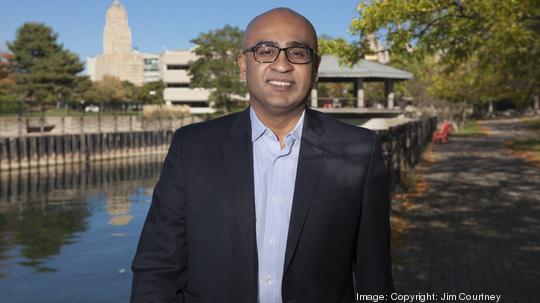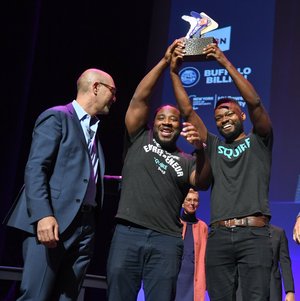
Strategically speaking, a company going public is about access to cash.
Symbolically, it’s often about a company’s ascendancy from startup-land.
Sometimes it doesn’t go as planned.
That is the case for Synacor Inc., whose board agreed recently to a $92 million go-private offer from Manhattan-based Centre Lane Partners. The deal is scheduled to close in the second quarter.
Synacor is the only software company in Buffalo to go public in the past few decades, though ACV Auctions (where Synacor co-founder George Chamoun is CEO and longtime Synacor investor Jordan Levy is a board member) has filed confidential documents paving the way for an IPO this year, according to a report by Axios reporter Dan Primack.
It looks like the end of an often chaotic period for Synacor, which straddled the line for years between disappointment and potential.
Before there was GameStop
The rise of an investor-fueled tech startup was a big story for years in Buffalo in the run-up to its 2012 public listing. Synacor initially sought to sell 6.8 million shares at $10 to $12 apiece, but lowered that projection to $5 per share just before its IPO.
A few months later, something exciting started happening with the stock. Following the company's first quarterly earnings statement, shares increased all the way to $10.09. Shares crested to $17 in July.
It looked initially like Wall Street had decided to get excited about Synacor. But in reality, the share price spike was fueled by the promotional activities of Jonathan Lebed, who created national news 12 years earlier as a high schooler when he made a fortune promoting penny stocks. He ended up settling a case brought by the U.S. Securities and Exchange Commission and agreed to pay $285,000 but admitted no wrongdoing.
Lebed’s story has gained a new wave of attention in recent weeks as the public markets have been roiled by day traders using platforms such as Robinhood to band together and squeeze short-sellers.
“$SYNC – Just give it two weeks. You’ll see what I mean.” Lebed tweeted on Aug. 1, 2012, after months of touting the stock.
But share prices slipped downward throughout the summer and fall, dipping underneath $5 by October 2012. Lebed's presence faded away from Synacor, where share prices continued to drop as changes to Microsoft Bing’s search engine cut into its advertising revenue.
Jordy vs. the activist investors
Synacor shares scraped along for several years, attracting the attention of activist shareholders in the summer of 2014. JEC Capital Partners and Ratio Capital Partners each purchased a 4.9% stake in the company and then broke away from quiet talks with company leaders, demanding the company provide a specific strategy for growth or pursue a strategic acquisition. They frequently assailed Levy, then Synacor board chairman, in a public back-and-forth that culminated in the company’s annual board of directors meeting in April 2015.
Reporters waited outside of the closed-door meeting, where a company-backed slate of directors, including Levy and CEO Himesh Bhise, ran against a slate chosen by the JEC.
The Synacor-backed directors were elected, and the activist investors largely retreated, noting that Synacor management owned a large percentage of the company.
AT&T
With the Lebed, Microsoft Bing and activist shareholder issues in the rearview and the 2014 appointment of Bhise as CEO, Synacor was a resurgent story for a time. That feeling culminated in 2016 when Synacor announced that it had been chosen to build and manage websites for AT&T, a move that led Bhise to predict that Synacor would reach $300 million in revenue by 2019.
The two sides did work together over the life of the contract, but the deal did not lead to the expansive growth envisioned at Synacor. In July 2019, AT&T notified Synacor that it planned to select another provider of portal services.
It's not as though all of Synacor's business left along with AT&T. The company provides a variety of software products and services in a variety of industries, and earned revenue of $24 million in its most recent quarter.
But the deal symbolizes the company's ongoing struggle to recapture the growth narrative of its early days.
As shares hovered in the $1.40 range, Synacor announced in February 2020 it would merge with a similar but smaller firm in Minneapolis, Qumu. But four months later, they called off the merger.
In the meantime, Levy resigned as Synacor board chair in March 2020, after more than two decades of working to create a robust publicly traded software firm in downtown Buffalo.
This month, the company’s board agreed to the deal with Centre Lane at a price that equates to $2.20 per share.







